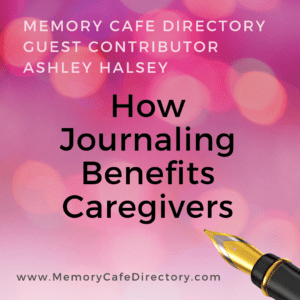Memory Cafe Directory posts and/or links to retailers can be advertising, sponsored, or affiliate links. We may earn a small commission from them. Thank you.
Guest Contributor: Ashley Halsey
Caregivers perform a vital role in our homes and communities, and with their numbers steadily increasing, focus has begun to shift to ensuring the wellbeing of these often unsung heroes, and rightly so.
Caregivers are often ‘on duty’ permanently, with little to no respite, and are required to provide emotional and mental, as well as physical support to those adults they care for. The role can be a challenging one, and an isolating one, too. Journaling can bring many benefits to the caregiver, from stress relief to problem solving, and we look in depth below at some of the many ways it can improve the life of both the carer and the cared for.
Journaling As Self Care
One of the biggest derivative challenges for the caregiver is dealing with stress. The stresses of the role can be huge, and unrelenting. Stress management and health go hand in hand, and so it is really important to find ways to manage the innate pressures that go with being a caregiver.
Research is clear on the link between stress and diseases and conditions such as high blood pressure, due to the undermining effect it has on the immune system. A stressed mind makes for an unhappy body, which, in turn, leads to further stress.
Journaling is an effective tool to combat stress. Using a journal to record your experiences, to note how you feel or simply to vent, is beneficial. Just taking the time to write down your thoughts provides a moment of breathing space, both literally and metaphorically. It’s an excellent way to take a mental ‘time out.’ By carving out a space for journaling in your day, you are taking an active first step in managing your stress levels and practicing vital self-care.
How To Begin
With respect to “journaling how to” getting started is easy – that’s the beauty of journaling. There are no set rules, no set items to buy, no expectations regarding the amount of time you spend on the activity or concern for an overarching end goal.
As for as a journaling definition, journaling is, by its very nature, about the process itself.
“Creativity in all its forms is restorative for mind and body, and so the act of putting pen to paper – whether in a physical or digital sense – is a great way to nurture and take time for yourself,” suggests Helen Rosenby of Draft Beyond.
Begin by choosing a notebook – using a dedicated book could be a good idea to separate off journaling from other aspects of your life as a caregiver; this is something personal for you to undertake, a private space for your thoughts, reflections, or anything else you want to record.
Next, think about whether you want to have a set time of the day or evening in which to journal, or whether you would prefer to write on an “as and when needed” basis. There is no right or wrong way to go about this process. Do whatever feels right and works for you.
How To Use Your Journal
Again, there are no rules, but here are some ideas to help you get started, which may be useful if you are new to journaling. Simply using your journal to freewrite your feelings, or to vent your anxieties or frustrations, is an incredibly powerful way to help reduce stress. Just putting those emotions on paper can help you to feel calmer, and will provide a mental relief.
Don’t feel self-conscious as you write, or concern yourself with editing your words – let your thoughts emerge freely and without restraint. This is a hugely cathartic way to use the journaling process.
Journaling topics are as varied as a caregiver’s responsibilities. Perhaps you could use your journal to record your daily experiences, both the good and the challenging ones. By setting down all the things that have gone well, your journal can serve as a reminder, in difficult times, of both your many triumphs as a caregiver and of happy experiences you have had with the person you care for.
Simply looking back over your journal will provide perspective when everything can seem overwhelmingly negative, and bring to mind the numerous things you have to feel proud of on your caring journey.
Journals are available that come with ready-made prompts, and so this could be a great option for you if you would feel more comfortable with some guidance to help get started. The prompts provide a structure for you to express your thoughts and chart your experiences. They are really useful to get you thinking about your feelings and responses, promoting a self-awareness that feeds into stress management. You are able to see clearly what triggers stress-inducing situations or responses, perhaps, and as a result, you can explore different approaches.
Journaling As Problem Solving
As well as being a safe space in which to vent your feelings, journaling can be an excellent tool to help find solutions to manage stress in your daily caregiving life. By using your journal as a way in which to record your observations, you may begin to notice patterns emerging.
Perhaps, looking over your entries, you will discover that the person you care for is consistently unhappy at the idea of a walk after lunch, but is more open to the suggestion in the morning. By using your journal as a way of gathering information, it can become a useful resource in planning your day in a way which manages the stress levels of both yourself and your cared for person.
Robert Sloman, lifestyle blogger at Writinity and Research papers UK, contends: “using a journal is a great way to boost confidence; re-reading your entries brings awareness of your capabilities, which could otherwise be easily overlooked in the hubbub of daily life.”
Journaling for Planning
You could also use your journal for planning. Writing down things you need to do or be aware of is not only useful in a practical sense but can help clear some “head space” through organizing your thoughts.
By working through, on paper, any aspects of your day that could prove challenging, you can start thinking about ways to manage these in advance. Journaling can be a great way to focus and clarify your thoughts, and using the process for planning can help to smooth out any potential rough patches in your day.
Journaling for Mental Health and Mindfulness
Journaling, by its very nature, fosters mindfulness. Mindfulness is essential in reducing stress and grounding the emotions. By taking the time to be present, to show up for ourselves, we can still the world around us, for a little while, to concentrate on our inner self and how we’re feeling.
This in turn, allows us to address, in a practical sense, and engage with stresses and strain and can lead to thinking of new ways to reduce these factors in our caregiving lives.
Journaling As A Way Of Life
Incorporating journaling into your daily life can bring great benefits. It has a role in self nurture, as you carve out some time in the day for the process. It has an ability to provide perspective and insight into patterns. It also has usefulness in managing conflict and strain and promoting a more mindful way of living.
Journaling is a perfect way to bring about real and gentle change in your life and to begin to control any stress you may be feeling in your role as a caregiver. In this way, journaling has the capacity to enrich your world, and the world of the special person to whom you provide care.
Ashley Halsey

Ashley Halsey
Ashley Halsey is a professional writer at Lucky Assignments Belfast and Gum Essays. Ashley is involved regularly in business projects throughout the country, and writes extensively on business and finance.
She has two children, and enjoys traveling, reading and attending business training courses.
Become a Contributor!
 Do you want to be a Memory Cafe Directory contributor? If you have helpful information to share with our community, read about the guidelines, then get in touch to discuss what you have to offer.
Do you want to be a Memory Cafe Directory contributor? If you have helpful information to share with our community, read about the guidelines, then get in touch to discuss what you have to offer.
Thank you.






